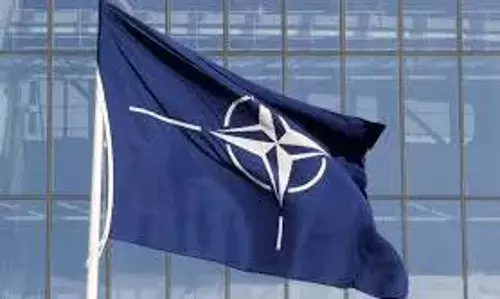
China plans $45 bn investments in Pakistan, signs 51 MoUs
text_fieldsIslamabad: Pakistan and China on Monday signed 51 agreements and Memoranda of Understanding (MoUs) for cooperation in diverse fields with visiting Chinese President Xi Jinping scheduled to unveil a $45-billion investment plan that can help Pakistan end its chronic energy crisis and transform it into a regional economic hub.
Xi, who arrived in Pakistan on Monday on a two-day visit, and Pakistan Prime Minister Nawaz Sharif witnessed the signing of the agreements in Islamabad.
The two leaders also unveiled plaques of eight projects to be undertaken in Pakistan with Chinese assistance.
The projects and agreements relate to China-Pakistan Economic Corridor, energy, infrastructure, agriculture, research and technology, education and other fields.
The prime minister said the agreements and MoUs signed by the two countries have sound financial and technical backing.
He reaffirmed that friendship with China was the cornerstone of Pakistan's foreign policy.
He said there were strong public sentiments driving the two countries' relations, which provide a sound basis for their strength.
Sharif said the most prominent hallmark of Pakistan-China relationship was consistency and resilience, irrespective of political developments, changes in the two countries and major regional and international developments.
Pakistan-China ties have remained robust. Relations between the two are based on shared ideals and principles of mutual trust, mutual benefit and respect, he said.
In his remarks, President Xi said the main objective of his visit was to further cement and give new boost to the strategic partnership and friendly ties with Pakistan.
He assured Sharif that China would continue playing its part for sustainable socio-economic development of Pakistan with particular focus on development in Balochistan province.
The Chinese president said special attention would be paid to further strengthen economic strategic partnership with Pakistan in next 10 years.
The Chinese president will unveil a $45-billion investment plan that can help Pakistan end its chronic energy crisis and help transform it into a regional economic hub.
The investments offer a real opportunity to change the scope Sino-Pakistan relationship "from geo-politics to geo-economics", said Federal Minister for Planning and Development Ahsan Iqbal.
The projects for which the whopping investments are expected to constitute the China-Pakistan Economic Corridor, and foresee the creation of road, rail and pipeline links that would cut several thousand km off the route to transport oil from the Middle East to China, while bypassing India.
"These are very substantial and tangible projects which will have a significant transformative effect on Pakistan's economy," Iqbal said.
Beijing hopes to increase investments in Pakistan as part of its ambitions to expand its trade and transport footprint across Central and South Asia, while countering US and Indian influence in the region.
The two allies have enjoyed close diplomatic and military relations for decades, though economic ties have only grown more recently. Bilateral trade crossed $12 billion last year compared to only $2 billion a decade earlier.
"The real opportunity of China-Pakistan Economic Corridor is that it changes the scope of the relationship from geo-politics to geo-economics," said Iqbal, who is overseeing the projects that constitute the economic corridor.
The upgrade would stretch 3,000 km from the port of Gwadar on the Arabian Sea to China's western city of Kashgar. Pakistan transferred control of the Gwadar port to a Chinese public company in 2013, giving China warm-water access.
Iqbal said $11 billion has been set aside for the corridor.
The two countries are also set to cooperate in gas, coal and solar energy projects to provide 16,400 MW of electricity - roughly equivalent to Pakistan's entire current capacity, said Iqbal.
Pakistan has wrestled with chronic power shortages in recent years that have scrubbed several points off GDP growth and inflicted misery on the everyday lives of its citizens.
Earlier on Monday, after bilateral talks at the Prime Minitser's House, Xi said he admired Pakistan Prime Minister Sharif's efforts for reforms in the country.
The Chinese president, after delegation-level talks were held here, also said Sharif was highly experienced and his struggle against terrorism was worthy of respect.
Pakistani and Chinese delegations held formal talks at the Prime Minister's House, where all aspects of bilateral relations between the two countries were reviewed.
Sharif, formally welcoming Xi on his maiden visit to Pakistan as president, hoped that the visit would further consolidate the already strong ties between the two countries.
During the meeting, in addition to boosting bilateral ties, both leaders also reviewed regional and international issues of mutual concern, including the regional security situation with respect to Afghanistan and the Middle East.






















